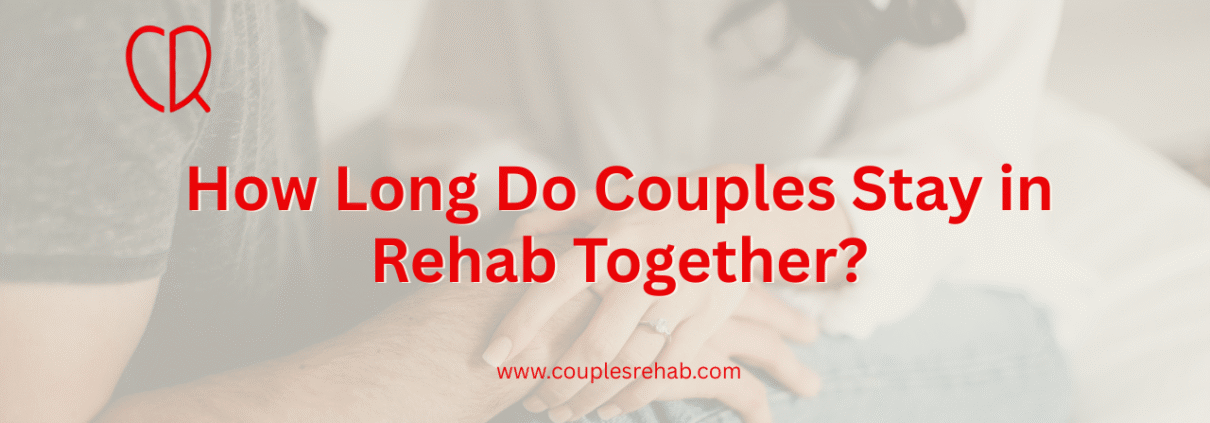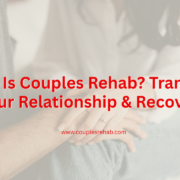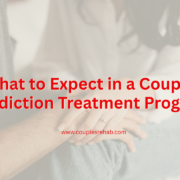When couples face addiction challenges together, seeking treatment as a unit can provide unique benefits. One of the most common questions that partners ask when considering this path is about timing: How long do couples stay in rehab together? This comprehensive guide explores the duration of couples rehabilitation programs, factors that influence length of stay, and what partners can expect throughout their journey to recovery.
Understanding Couples Rehab: A Joint Path to Recovery
Couples rehabilitation represents a specialized approach to addiction treatment where partners undergo therapy and recovery processes simultaneously. At Couples Rehab, we’ve witnessed firsthand how this unified approach can strengthen relationships while addressing substance use disorders.
The duration of treatment varies significantly based on multiple factors, including:
- The severity and type of addiction
- Presence of co-occurring disorders
- Individual and relationship needs
- Insurance coverage and financial considerations
- Program structure and methodology
Before diving into specific timeframes, it’s important to understand that effective recovery isn’t measured solely by days spent in treatment, but rather by the quality of care received and the sustainable coping mechanisms developed.
Average Length of Stay for Married Couples in Inpatient Rehab
Inpatient rehabilitation provides a structured environment where couples can focus entirely on their recovery without external distractions or triggers. But how long is the average stay for married couples in residential treatment?
Typically, couples entering inpatient rehabilitation programs can expect:
Standard Inpatient Duration Options
- Short-term programs: 28-30 days
- Medium-length programs: 60-90 days
- Long-term residential programs: 6 months to a year
Research consistently shows that longer treatment durations correlate with better outcomes. According to the National Institute on Drug Abuse (NIDA), treatment lasting less than 90 days is of limited effectiveness, and significantly better outcomes occur with longer treatment episodes.
At Couples Rehab, we’ve observed that married couples often benefit from medium to longer-term programs, as this allows sufficient time to address both individual addiction issues and relationship dynamics that may contribute to substance use.
Duration of Couples Addiction Treatment Programs by Type
Different treatment modalities and program structures influence how long couples will remain in rehabilitation settings. Understanding these variations can help partners set realistic expectations.
Detoxification Period (3-14 days)
Before formal rehabilitation begins, couples may need to complete a medically supervised detoxification. This critical phase:
- Typically lasts 3-14 days depending on substances used
- Addresses physical dependence and withdrawal symptoms
- Prepares both partners for the therapeutic work ahead
It’s important to note: Detox alone is never sufficient for long-term recovery and must be followed by comprehensive rehabilitation.
Intensive Outpatient Programs (IOP) (8-12 weeks)
For couples who cannot commit to residential treatment due to work, family, or other obligations, Intensive Outpatient Programs offer a viable alternative:
- Generally require 9-12 hours of weekly participation
- Last approximately 8-12 weeks on average
- Allow couples to maintain normal life responsibilities while receiving treatment
Partial Hospitalization Programs (PHP) (2-4 weeks)
These structured daytime programs offer intensive treatment while allowing couples to return home in the evenings:
- Typically involve 5-7 days per week of treatment
- Sessions usually last 4-6 hours daily
- Average program duration is 2-4 weeks
Standard Outpatient Treatment (3-6 months)
Less intensive than IOPs, standard outpatient treatment provides ongoing support:
- Usually involves 1-3 sessions per week
- Each session lasts 1-2 hours
- Programs typically continue for 3-6 months
How Long is Couples Rehab for Different Substance Addictions?
The type and severity of substance addiction significantly impacts the recommended length of stay in rehabilitation. Couples addressing different substances may require tailored treatment durations.
Alcohol Dependence
- Mild to moderate dependence: 30-90 days of treatment
- Severe dependence with long history: 90+ days, sometimes requiring long-term residential care
- With co-occurring disorders: Often requires extended treatment of 90-180 days
Opioid Addiction
- Short-acting opioids (heroin, certain prescription medications): Minimum 90 days, with many experts recommending 6-12 months of treatment including medication-assisted therapy
- Long-acting opioids (methadone, extended-release oxycodone): Often requires 6+ months of comprehensive treatment
Stimulant Addiction (Cocaine, Methamphetamine)
- Standard recommendation: Minimum 90 days of intensive treatment
- For chronic, long-term use: 6+ months of combined intensive and maintenance treatment
- Post-acute withdrawal considerations: Extended support often needed for up to 24 months
Benzodiazepine Dependence
- Tapering period: Can extend treatment by 2-8 weeks depending on usage history
- Post-taper therapy: Minimum 30-90 additional days
- For long-term, high-dose users: May require 6+ months of comprehensive care
At Couples Rehab, we carefully assess both partners’ substance use patterns to determine the most appropriate treatment duration, recognizing that when partners have different substances of choice, the treatment plan must accommodate both sets of needs.
Long-Term Residential Rehab Options for Couples
For couples with severe addiction issues, complex co-occurring disorders, or multiple relapse episodes, long-term residential rehabilitation provides the most comprehensive care option.
Benefits of Extended Residential Treatment
Long-term programs offer distinct advantages for couples facing significant challenges:
- More time to address deeply ingrained patterns
- Opportunity to practice new communication and conflict resolution skills
- Gradual reintegration planning with ongoing support
- Higher success rates for complex cases
Typical Long-Term Program Durations
- Traditional therapeutic communities: 6-12 months
- Extended care facilities: 3-6 months
- Sober living with outpatient treatment: 6-24 months
Research indicates that completion of long-term treatment programs can increase sobriety success rates by up to 40% compared to shorter programs, making them a valuable investment for couples committed to lasting recovery.
Couples Therapy Duration for Co-Occurring Disorders
When addiction coincides with mental health conditions—such as depression, anxiety, PTSD, or personality disorders—treatment becomes more complex and typically requires longer durations.
Integrated Treatment Timeframes
Couples dealing with co-occurring disorders often follow these general treatment timelines:
- Initial stabilization phase: 2-4 weeks
- Intensive integrated treatment: 3-6 months
- Maintenance and relapse prevention: 6-12+ months of ongoing care
Important consideration: When both partners have co-occurring disorders, especially if they differ in nature, treatment may need to be extended to address each person’s unique needs while still working on relationship dynamics.
Couples Rehab specializes in dual-diagnosis treatment that simultaneously addresses addiction and mental health conditions, providing the comprehensive care that complex cases require.
Typical Length of Behavioral Couples Therapy (BCT) in Rehab

Behavioral Couples Therapy represents one of the most evidence-based approaches for treating addiction within the context of a relationship. This specialized methodology focuses on improving relationship functioning while addressing substance use.
BCT Treatment Duration Guidelines
- Standard BCT protocol: 12-20 weekly sessions (3-5 months)
- Intensive BCT during inpatient treatment: Daily or multiple weekly sessions for 4-12 weeks
- Maintenance BCT: Monthly sessions for 6-12 months after primary treatment
Research published in the Journal of Substance Abuse Treatment demonstrates that couples who complete a full course of BCT show significantly higher abstinence rates and relationship satisfaction compared to individuals receiving treatment alone.
At Couples Rehab, we incorporate BCT principles throughout our treatment programs, adjusting the intensity and duration based on each couple’s specific needs and progress.
Sober Living Arrangements for Couples After Rehab Duration
The transition from formal treatment to everyday life represents a critical period in the recovery journey. Sober living arrangements can provide a supportive intermediate step for couples.
Typical Duration in Couples Sober Living
- Minimum recommended stay: 90 days
- Average stay: 6-12 months
- Extended recovery support: Some couples benefit from 12-24 months in supportive housing
These structured living environments allow couples to:
- Practice sobriety skills in a real-world setting
- Build connections with a recovery community
- Gradually increase independence while maintaining accountability
- Solidify relationship improvements made during formal treatment
Key factor: Couples who extend their recovery support through sober living arrangements show significantly lower relapse rates during the critical first two years of recovery.
Factors Influencing Length of Stay in Couples Drug Rehab
Multiple variables determine how long a particular couple should remain in treatment. Understanding these factors helps set realistic expectations and plan accordingly.
Clinical Considerations
- Addiction severity and duration: Longer histories typically require extended treatment
- Physical health complications: May extend detox and early recovery phases
- Mental health status: Co-occurring disorders often necessitate longer treatment
- Previous treatment attempts: Multiple prior relapses may indicate need for longer programs
- Cognitive functioning: Substances that impact cognition may require extended recovery time
Relationship Factors
- Relationship duration and patterns: Long-established dysfunctional patterns take time to change
- Presence of domestic violence: Requires specialized treatment and safety planning
- Codependency issues: Often requires extended therapeutic intervention
- Family dynamics: Involvement of children or extended family can complicate treatment
Practical Considerations
- Insurance coverage: May limit duration of covered treatment
- Financial resources: Ability to self-pay for extended care
- Work and family obligations: May impact ability to participate in longer programs
- Legal requirements: Court-mandated treatment may have specific duration requirements
At Couples Rehab, we conduct thorough assessments of both individual and relationship factors to recommend the optimal treatment duration for each couple’s specific situation.
Couples Rehab Success Rates Based on Program Length
Research consistently demonstrates a correlation between treatment duration and outcomes. Understanding this relationship can help couples make informed decisions about their commitment to recovery.
Success Rate Comparisons
- 30-day programs: Approximately 30% maintain sobriety at one year
- 90-day programs: Approximately 50% maintain sobriety at one year
- 6+ month programs: Up to 85% maintain sobriety at one year when followed by appropriate aftercare
Important note: These statistics represent general trends. Individual results vary based on numerous factors beyond program length.
Relapse Rates by Treatment Duration
Studies examining couples specifically have found:
- Couples who complete less than 30 days of treatment show relapse rates of approximately 75% within the first year
- Couples completing 90+ days of treatment followed by aftercare show relapse rates reduced to approximately 40% within the first year
- Couples who complete long-term treatment (6+ months) and maintain involvement in aftercare show the lowest relapse rates at approximately 15-25% within the first year
These statistics underscore the value of longer treatment episodes, especially for couples dealing with complex addiction issues.
Short-Term vs. Long-Term Couples Rehab Programs: What’s the Difference in Duration?
Understanding the fundamental differences between short and long-term treatment approaches helps couples make appropriate choices based on their specific needs.
Short-Term Programs (30 days or less)
Short-term rehabilitation programs typically:
- Focus on stabilization and initial recovery skills
- Provide intensive introduction to recovery concepts
- Develop preliminary relapse prevention plans
- Begin addressing relationship dynamics
Best suited for: Couples with milder addiction issues, strong support systems, high motivation, and minimal complications.
Medium-Length Programs (31-90 days)
These programs offer:
- More comprehensive addiction education
- Deeper exploration of relationship patterns
- Development of stronger coping mechanisms
- Initial practice of new communication skills
- Beginning work on underlying issues
Best suited for: Couples with moderate addiction severity, some relationship challenges, and minimal co-occurring disorders.
Long-Term Programs (90+ days)
Extended treatment provides:
- In-depth addressing of underlying trauma and issues
- Substantial time to practice new behaviors
- Comprehensive relapse prevention planning
- Family reintegration preparation
- Vocational and life skills development
- Thorough relationship restructuring
Best suited for: Couples with severe addiction, complex relationship dynamics, co-occurring disorders, previous treatment failures, or limited support systems.
At Couples Rehab, we offer programs across this spectrum, recognizing that different couples require different levels of care and treatment durations.
Creating a Personalized Timeline: The Couples Rehab Approach
Rather than adopting a one-size-fits-all approach to treatment duration, Couples Rehab emphasizes personalized care planning that considers each couple’s unique circumstances.
Our Assessment Process
When determining optimal treatment length, our clinical team evaluates:
- Comprehensive substance use history for both partners
- Relationship assessment and dynamics
- Mental and physical health evaluations
- Previous treatment experiences and outcomes
- Support system strength and availability
- Practical constraints and resources
Flexible Treatment Progression
Our programs feature:
- Regular progress evaluations
- Adjustable treatment intensity based on response
- Phased approaches allowing for extension when needed
- Customized aftercare planning
Continuous Care Model
We emphasize that recovery extends beyond formal treatment through:
- Graduated step-down programming
- Ongoing couples therapy options
- Alumni support programs
- Family integration services
Top 10 FAQs About Couples Rehab Duration
1. Is 30 days enough time for couples rehab?
While 30-day programs provide a foundation, research suggests this duration is often insufficient for lasting change, especially for couples. Most addiction specialists recommend a minimum of 90 days of treatment for couples to address both individual substance use issues and relationship dynamics.
2. Can couples with different substances of abuse be treated together for the same duration?
Yes, but treatment plans must accommodate both partners’ needs. The partner requiring longer treatment (e.g., for opioid addiction vs. alcohol) often sets the baseline duration, with customized components for each individual’s specific substance issues.
3. How does insurance coverage impact length of stay in couples rehab?
Most insurance plans limit coverage for addiction treatment, typically covering 14-30 days of inpatient care. Couples often need to combine insurance benefits with self-pay options or payment plans for longer stays. Couples Rehab offers financial counseling to help navigate these challenges.
4. What happens if one partner wants to leave treatment early?
This common challenge requires careful handling. Our treatment teams work to identify the underlying concerns, provide additional support, and potentially modify treatment approaches while encouraging completion of recommended treatment duration for optimal outcomes.
5. Do both partners need to stay in treatment for the same length of time?
Ideally, couples progress through treatment together. However, individualized care sometimes means different treatment durations or intensities. Our programs can accommodate transitions where one partner moves to a less intensive level of care while the other continues more intensive treatment.
6. How long does the detoxification phase last in couples rehab?
Detoxification typically lasts 3-14 days depending on substances used, usage patterns, and individual health factors. For couples where both partners require detox, the longer individual timeline generally determines the transition point to the next phase of treatment.
7. Is there a minimum recommended stay for couples with children?
For couples with children, we generally recommend a minimum 90-day treatment episode followed by substantial aftercare. This duration allows for adequate parenting skills development and family reintegration planning in addition to addiction recovery work.
8. How does treatment duration affect success rates for couples?
Research consistently shows that longer treatment durations correlate with better outcomes. Couples who complete 90+ days of treatment show significantly higher rates of sustained sobriety and relationship satisfaction compared to those completing shorter programs.
9. Can couples extend their stay if needed?
At Couples Rehab, we offer flexible programming that allows for treatment extensions when clinically indicated. Regular progress assessments help determine when additional time would benefit the recovery process.
10. What is the recommended aftercare duration following couples rehab?
Aftercare should continue for a minimum of 12 months following formal treatment, with decreasing intensity over time. Couples who maintain some form of recovery support for 1-2 years show the highest long-term success rates.
Conclusion: Investing in Recovery—Time as a Healing Factor
When asking “how long do couples stay in rehab together?” it’s important to recognize that recovery is not merely about time spent in treatment, but rather about the quality of that time and the foundation it builds for lasting change.
The journey of couples recovery extends beyond formal rehabilitation, continuing through aftercare, community support, and ongoing relationship growth. At Couples Rehab, we witness daily how adequate treatment duration combined with quality care transforms relationships and lives.
For couples considering rehabilitation, we encourage viewing treatment not as time away from life, but as an investment in a healthier, more fulfilling future together. While the path may seem long, each day in recovery brings new skills, insights, and strengths that support lasting wellness.
If you’re ready to begin your journey to recovery as a couple, reach out to Couples Rehab today. Our specialists will help you understand the treatment duration that best fits your unique situation and guide you through each step of the process.
Remember: Recovery happens one day at a time, and with the right support, those days build a lifetime of recovery.












Leave a Reply
Want to join the discussion?Feel free to contribute!